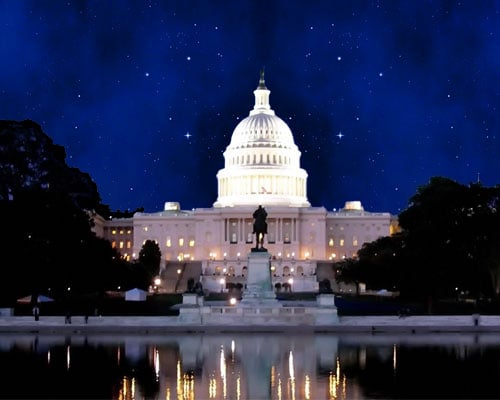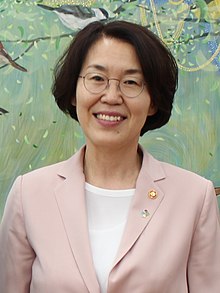Public Policy and Government Affairs
Biweekly Washington, D.C. Update for the Week Ending February 25, 2022
Written by: Elizabeth Anderson

The space community looks to the International Space Station and the future of international collaboration as Russia’s invasion of Ukraine continues to escalate. China denies the rocket stage set to impact the Moon was from the 2014 Chang’e 5-T1 mission.
Virtual Space Foundation Events
Interview with Joy White
Space Systems Command (SSC) Executive Director Joy White shares how SSC is adapting to keep pace with rapidly evolving threats in an increasingly contested and congested space environment. SSC is the acquisition arm of the United States Space Force, and is responsible for the development, delivery, and sustainment of resilient space capabilities. Check out the interview on our Symposium 365 platform here.
Space Matters
Space Foundation’s new series, “Space Matters,” convenes well known policy influencers for high level space policy conversations on emerging topics and trends within the global space economy. Check out the second episode here.
US Space Policy Updates
- US sanctions on Russia include a “Russia-wide denial of exports of sensitive technology, primarily targeting the Russian defense, aviation, and maritime sectors,” a move which will target Roscosmos (White House, February 24)
- NASA’s Artemis 1 launch date slipped to late May (NASA, February 24)
- Air Force Secretary Frank Kendall announced that the 2024 Space Force budget will make a large pivot to China (Breaking Defense, February 24)
- Director of the National Reconnaissance Office (NRO) Christopher Scolese warned satellites could be targeted by Russia as Ukraine crisis unfolds (Space News, February 23)
- NASA confirmed its engine controller failure will not impact the first SLS test flight (Spaceflight Now, February 22)
- The National Oceanic and Atmospheric Administration (NOAA) issued a request for commercial sensors and tracking services for objects orbiting Earth (NOAA, February 17)
- The Department of Defense released its report “State of Competition in the Defense Industrial Base” calling for strengthened oversight of industry mergers (DOD, February 15)
- The Department of Commerce released a prototype cloud-based system for space traffic management (Executive Government, February 14)
- The James Webb Space Telescope released images of its first star (NASA, February 14)
- House Energy and Commerce Committee leadership released drafts of two bills to better equip the Federal Communication Commission (FCC) for modernizing satellite licensing rules and authorities (House Energy and Commerce Committee, February 11)
- The National Oceanic and Atmospheric Administration (NOAA) announced plans for a civilian alternate to DOD space debris tracking system (Breaking Defense, February 11)
- NASA announced the selection of two Heliophysics missions (Space News, February 10)
International Space Policy Updates
- The European Space Agency (ESA) is continuing operations on the ISS and ExoMars programs in the wake of Russia’s invasion of Ukraine (Space News, February 25)
- The Australian Space Agency (ASA) received $32 million in funding from the Australian government to invest in new spaceports and launch sites to make Australia a more attractive prospect for private launch companies (Nationwide News, February 25)
- The Egyptian Space Agency (EgSA) signed a cooperation protocol with the Egyptian Ministry of Education to develop capacity in space science and technology (Space in Africa, February 24)
- The Brazilian Space Agency (BSA) and Amazon Web Services (AWS) signed a letter of intent to develop national space R&D programs as well as policy and regulatory measures (Via Satellite, February 17)
- French President Emmanuel Macron called for the establishment of a human space exploration program at the 2022 European Space Agency (ESA) Space Summit (ESA, February 16)
- China announced its willingness to establish more formal lines of communication with the United States on space safety (Space News, February 15)
- India successfully launched three rockets (Space Flight Now, February 14)
Space Industry Updates
- Virgin Galactic is on track to begin commercial suborbital flights in 2022 (Space.com, February 24)
- Northrop Grumman won a $341 million Space Force contract to develop the Deep Space Advanced Radar Capability (Northrop Grumman, February 24)
- SpaceX launched 21 Starlink satellites into a higher orbit than normal just three weeks after 38 Starlink satellites prematurely fell back to Earth (Spaceflight Now, February 21)
- Belgian satellite company Aerospacelab raised €40 million in Series B funding (Aerospacelab, February 16)
- Inspiration4 crew member Jared Isaacman announced the Polaris Program, a commissioned commercial partnership with SpaceX (The Washington Post, February 14)
- Lockheed Martin announced its intent to stop its acquisition of Aerojet Rocketdyne following a lawsuit from the Federal Trade Commission (The Washington Examiner, February 14)
- Arianespace launched 34 Smallsats from Kourou, French Guyana (Sat News, February 10)
Space Leader Profile – Dr. Lim Hye-Sook

Dr. Lim Hye-Sook is the Republic of Korea’s (ROK) Minister of Science and Information and Communication Technologies. Since May of 2021, Minister Lim has bolstered her nation’s technology programs under her direction of the 25 research institutes. Minister Lim has taken a decisive path forward, in particular with ROK’s defense and aerospace industries, capitalizing on President Biden’s strategic action to lift restrictions imposed in 1979.
After earning her Bachelors and Masters at Seoul National University, Minister Lim ventured to the United States where she obtained her PhD at the University of Texas at Austin. Following a lengthy career in the United States at Hewlett Packard, Bell Lab, and Cisco Systems, Minister Lim returned to Seoul where she taught electronic and electrical engineering at Ewha Woman’s University.
Having attended an all-girls high school, taught at an all-female university, and a lifetime member at the Association of Korean Woman Scientists and Engineers, Minister Lim has long encouraged and shown legitimate action in helping women integrate the STEM community. Minister Lim said she is firmly committed, “…to foster an environment where female scientists and engineers can unlock their full potential.”
In less than a year, Minister Lim signed onto the Artemis Accords, begun to meaningfully collaborate with NASA on the Artemis mission, launched the ROK’s first fully indigenous rocket, spurred the domestic aerospace industry with the goal to create 110 dual-use satellites as part of a ten-year and $13 billion space defense program, signed an memorandum of understanding with regional ally Australia for space affairs, and visited the United States alongside President Moon. Beyond space affairs, Minister Lim looks to lead Korea’s development of 5G networks, Artificial Intelligence, and carbon management technologies, among others.
Reading Corner
The Hill | Is our space partnership with Russia immune from Earthly conflicts?
Former NASA Astronaut Commander Terry Verts weighs in on Russia’s invasion of Ukraine and its potential impact on the US’s partnership with Russia in space.

